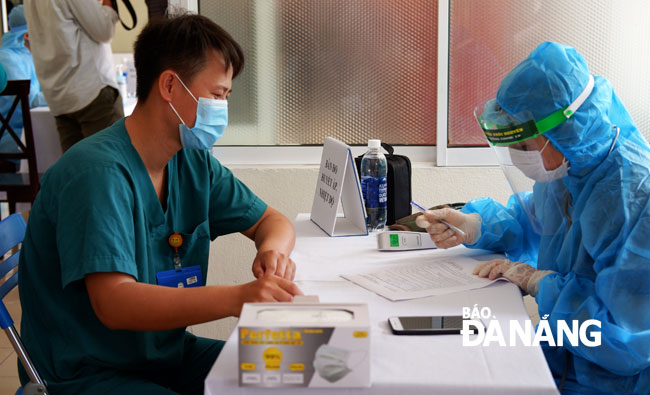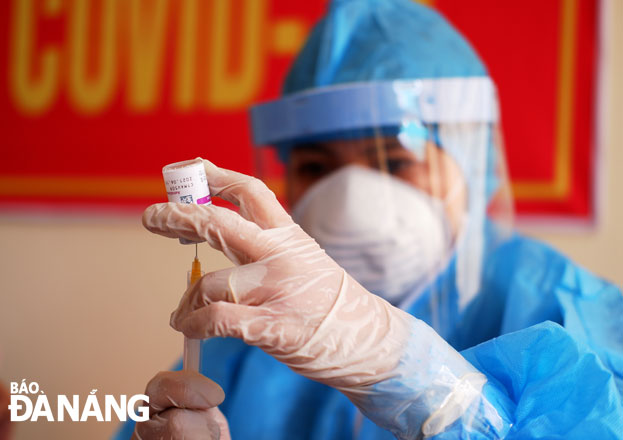No serious reactions reported after Da Nang's first COVID-19 vaccination shots
There have been no serious reactions reported since Da Nang began its COVID-19 vaccination campaign on Friday with AstraZeneca shots prioritised for medical workers who are now participating in coronavirus prevention tasks at the Lung Hospital. This is the only medical facility in the city where COVID-19 imported cases are being treated.
 |
| Only seven vaccinated people displayed normal symptoms which had been predicted, including pain at the injection spot, headache, nausea, and muscle pain. |
The inoculation was within the framework of the Vietnamese Health Ministry's COVID-19 vaccination drive which started on 8 March.
Medical staff is amongst the 11 priority groups of people eligible for the first COVID-19 vaccination in Viet Nam.
According to doctor Nguyen Tien Hong, Deputy Director of the municipal Department of Health, on Friday, COVID-19 doses were injected into 117 local medical workers, 90 of whom are from the Lung Hospital and the rest are from the General Hospital, the Cancer Hospital and the Hospital of Maternity and Pediatrics.
Nurse Nguyen Thi Bay, 54, was very happy to be amongst the first persons in Da Nang to receive COVID-19 vaccine. She has participated in the coronavirus prevention and control from August 2020 when Da Nang was a COVID-19 epicentre in Viet Nam
Initial reports said that only seven people experience mild symptoms after being vaccinated, including pain at the injection spot, headache, nausea and muscle pain.
After getting the COVID-19 vaccine, all these medical workers have returned to normal work.
 |
| The preservation of the vaccine doses meets the standards set by Vietnamese Ministry of Health on the storage of vaccines for immunisation activities. |
The vaccination being done in the order of registration - counseling - examination - injection and post- injection monitoring procedures, doctor Le Thanh Phuc, Director of the Lung Hospital said.
Pre-injection screening is a very important step as those who show abnormal signs of health are not allowed to get vaccinated.
The preservation of the vaccine doses meets the standards set by Vietnamese Ministry of Health on the storage of vaccines for immunisation activities.
The doses injected into the Da Nang medical staff were part of a first batch of 117,600 doses of COVID-19 vaccine, part of an order of 204,000 doses approved by the Vietnamese Ministry of Health, developed by British-Swedish pharmaceutical company AstraZeneca in collaboration with the UK-based Oxford University. The vaccine shipment of the 117,600 shots arrived in Viet Nam on 24 February.
According to VNVC, which is the importer, the AstraZeneca vaccine provides a high immune response from 62 percent to 90 percent. Study results showed that 100 percent of the vaccinated people had an immune response to COVID-19 without any serious complications.
Under the regulations of the Ministry of Health, COVID-19 vaccination sites must meet strict standards for storing and preserving the vaccines, be arranged to include designated areas for reception, waiting, clinical screening, vaccination rooms, post-injection monitoring rooms, and anaphylactic treatment rooms with one-way rule, be equipped with anaphylactic treatment boxes, and comply with epidemic prevention regulations.
The Ministry of Health also requires pre-vaccination screening on all vaccinated people. They have to be given guidelines on how to monitor their health and note post-injection reactions.
In the coming time, Da Nang will continue to conduct vaccination against COVID-19 for other priority groups of eligible people under the direction of Viet Nam's national government.
Of course, the timing and quantity depend on the allocation and instructions from the Vietnamese Ministry of Health.
In light of vaccine supply being still limited for the time being, it is essential that the public across continue to comply with the compulsory COVID-19 prevention and control measures.
Currently, only two COVID-19 patients who returned to Da Nang from foreign countries are being treated at the city-based Lung Hospital. The hospital staff are still working with a high sense of responsibility and dedication at a potential risk of coronavirus infections. Their absolute safety, therefore, must be safeguarded.
By PHAN CHUNG, TUYET NHI- Translated by A.T